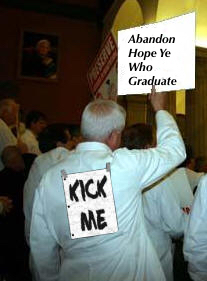A Direct Answer to Professional Depression
In between reading holiday stories about radical Islamists’ new hoverboard’s catching on fire, I came across a story about depression among residents. I skimmed it, not really caring about whiny residents or their situational blues that as far as I know are just par for training. But then my bloodshot eye lingered on a link to another story, “This woman argues being a doctor is “humiliating.””
The piece by Daniela Drake is a good one, and I really hope all of you will read it for yourselves. As you do, compare it to what the Doofus from Duke recently wrote on the same topic. She leads off repeating the stat that over 300 physicians will commit suicide this year, springboarding into the larger question of why docs are so damn unhappy in jobs they spent so much time and money to chase. Drake cites a 2012 survey of over 5,000 doctors that found 9 of 10 actively discouraged others from going into this field. After noting the public’s scorn for high-dollar radiologists and ophthalmologists, she gives a great quote: “But being a primary care physician is not like being, say, a plastic surgeon—a profession that garners both respect and retirement savings. Given that primary care doctors do the work that no one else is willing to do, being a primary care physician is more like being a janitor—but without the social status or union protections.”
- The average face-to-face patient visit is 12 minutes.
- “Just processing the insurance forms costs $58 for every patient encounter”
- As more docs become employed, their patient loads if anything go up … “that means seeing 24 or more patients a day, and often these patients have 10 or more medical problems.”
- Greater reliance on guidelines rather than clinical judgment
- Constant pressure to improve productivity and satisfaction scores: Don’t meet the targets, and your pay goes down even though you did just as much work.
Time for another great quote: ” Doctors need to have the ability to say no. If not, when patients go to see the doctor, they won’t actually have a physician—they’ll have a hostage.”
- “A stunning and unmanageable number of forms … Reams of lab results, refill requests, emails, and callbacks … Calls to plead with insurance companies …Every decision carries with it an implied threat of malpractice litigation … prompt disciplining or patient complaint … all of these tasks have to be done on the exhausted doctor’s personal time.”
Well shucks, who wouldn’t sign up for that?? Author Drake even referred to the MOC requirements by the ABIM as “their own act of hostage taking.” The author isn’t flawless, and gives the LELT’s too much credit for “excellent primary care”, but it doesn’t spoil the theme: “The meme is that doctors are getting away with something and need constant training, watching and regulating … Regulating the physician is an easy sell because it is a fantasy—a Freudian fever dream—the wish to diminish, punish and control a disappointing parent, give him a report card, and tell him to wash his hands.”
This isn’t a bitch blog, and it’s not bitching to state facts. Yeah we’re glad to be employed, but this isn’t fun work. So what’s the fix? Is there a way to recapture any fun, any sense of pride in medicine? For primary care at least, it’s the Direct approach. The patient pays you, and you work for the patient. Then you both know who to complain to.










You hit the nail on the head. Students need to stay away from primary care as it is now. Trying to trail blaze as Doug is doing is going to be very hard. Setup in an economically depressed area and one can lose their shirt. Setup in a decent area and can lead to a satisfying situation has he reports.
Kurt
Ben’s right – what we have done is allowed the stereotypes of physicians to proliferate beyond any perception of reality. I still see cartoons about doctors playing golf on Wednesday afternoons (what’s golf?) or surgically removing people’s wallets in the OR.
The profession is the target of stereotypes every bit as obnoxious as ethnicity, race or gender. “Plastic surgery” is not nose jobs to the stars – not that THAT job wouldn’t be stressful! but “face jobs” to burn victims and “butt jobs” for a stage III decubitus.
There’s no part of medicine that provides E-Z glory – unless it’s running a national specialty board. Paper shuffling, in general, is a white-collar profession; jobs you have to wear gloves for, including doctoring, a blue-collar profession.
I love medicine for what it is intrinsically – not for what you get when you run down the hamster maze and get to the end. It’s no peanuts there, only shocks.
I resent the plastic surgeon derogatory .Medscape surveys show plastic surgeons have the highest dissatisfaction. Very few of us are in Beverly Hills. Add an average of seven years of surgical training, lawsuits, dissatisfied patients, and extensive competition from non plastic surgeons it is just as challenging if not more than other fields. We can’t even pick up and move to another situation as there are no jobs. Income is in the middle of the pack and we have some very bad years. I have a friend who netted 30,000 one year after expenses after 20 years in practice. I currently compete against an ER me and gynecologist e ho do my paying patients but I get all the uninsured call and Medicaid pressure sores.